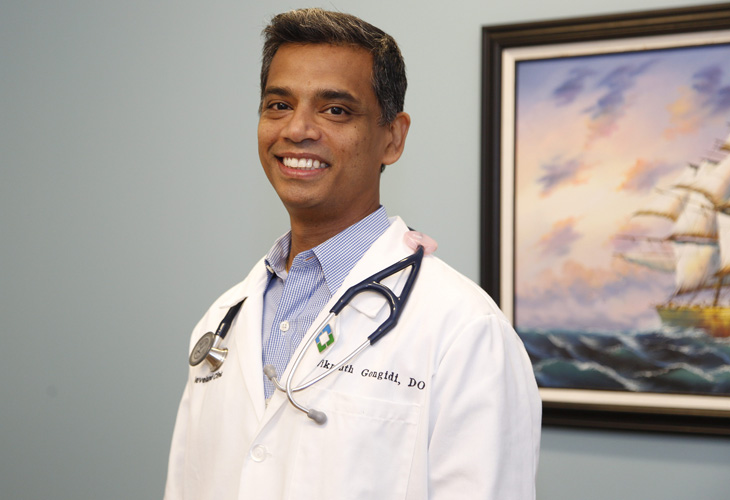Cardiac amyloidosis has been around for a long time, but until recently it was rarely diagnosed, and if it was, there was no proven treatment for the condition.
Dr. Vikranth Gongidi, DO, an invasive cardiologist affiliated with Cleveland Clinic’s Indian River Hospital, is one of the relatively few cardiologists who has successfully diagnosed and treated cardiac amyloidosis. “Basically, the body is making too much amyloid, a protein made in the liver, and in certain individuals it gets deposited in different organs including the heart, kidney and brain. When this happens, it separates the tissue and the tissue doesn’t work properly,” explained Dr. Gongidi. “It’s similar to Alzheimer’s or Dementia of the brain, when there is extra protein being deposited where it’s not supposed to be and the body isn’t able to clear it out.”
Patients experience symptoms mimicking those of heart failure, including shortness of breath, fatigue, swelling of the legs, heart palpitations, lightheadedness and thickened heart tissue. According to Dr. Gongidi, the extra protein builds up and makes the heart muscle thick and beefy, a condition called cardiomyopathy. Since the chest can’t expand and the heart has nowhere to go, it can’t pump out enough blood, resulting in the shortness of breath. In the past doctors believed it was just a part of the aging process or a byproduct of high blood pressure.
Now, with proper testing, a definitive diagnosis of cardiac amyloidosis can be confirmed, and medication can be prescribed to arrest its progress.
“When a patient comes to me with very thick heart muscle, I diagnose the problem using an echocardiogram of the left ventricle,” said Dr. Gongidi. “If the echocardiogram shows severe hypertrophy, I order blood tests and, in the hospital, we’ll do a special test called a PYP scan, similar to an MRI which produces a nuclear scan of the heart. If the tests confirm the diagnosis, we can start the patient on medication to treat the condition.”
Cleveland Clinic Indian River Hospital has had the special testing available for about nine months and the new medication, recently approved by the FDA after extensive studies and trials, has been available for about six months. The medication, known as Pafamidis or Vyndamax, stabilizes the proteins made in the liver so they don’t misfold and get deposited in the heart. The advanced testing is paramount in the diagnosis of cardiac amyloidosis and new medication provides a promise of managing the disease.
“Because of the new testing, we now have a treatment,” continued Dr. Gongidi. “Not many cardiologists are looking for it, and because it’s a rare disease it requires testing to diagnose. It’s most prevalent in older adults, with 20 percent of the population between the ages of 80-90 being affected, and was often brushed off as a natural part of aging. Fortunately, we can now test, diagnose and treat the condition. The treatment is so new that we don’t have long-term statistics on whether it can actually reverse the condition [instead of just keeping it from getting worse], but there is hope and more research will go into it.”
“The most common heart condition I see is coronary of the arteries resulting in blockage of the heart,” said Dr. Gongidi. “Hypertension supersedes all of it. The one thing I always advise for my patients to do is to stay active. Go for a walk. A 30-40 minute cardiovascular walk every day will lower your blood pressure, keep your body weight in check and relieve stress. You don’t need to be part of gym because you can literally walk anywhere, socially distance easily and you can do it at any age.”
When asked if COVID-19 has any effect on the heart, he said that in some cases COVID-19 is causing cardi myopathy or a weakening of the heart muscle, which in turn causes congestive heart failure. It can also cause blood clots in the lungs, kidneys and systemically, which puts a strain on the heart and inhibits its ability to pump properly.
“There was a trial that looked at 54 young athletes at West Virginia University who had tested positive for COVID,” recalled Dr. Gongidi. “Some of them had shortness of breath and fever, others were asymptomatic. About a month after their positive test, researchers did a cardiac MRI and one third of those patients showed evidence of heart abnormalities. Some showed inflammation and scarring of the heart, as if they had a heart attack.
“We honestly don’t know what to make of it because typically when we see scar tissue of the heart, it’s from a prior heart attack and it can lead to arrhythmia later in life. We simply don’t know all there is to know about COVID. You may have recovered from it now, but five years from now there may be long-lasting effects. The best thing you can do is wear a mask and socially distance.”
Dr. Gongidi specializes in Diagnostic Catheterization, Nuclear Cardiology, Transesophageal Echocardiography (TEE), Transthoracic Echocardiography (TTE) Stress Echocardiography and Vascular Imaging. He is a graduate of the University of North Carolina, Chapel Hill, and completed his internal medicine internship and residency at Botsford Hospital in Farmington Hill, Michigan. His cardiology fellowship was completed at the University of Medicine and Dentistry of New Jersey in Stratford, New Jersey.
He is a member of the Indian River Medical Center Cardiology Practice with offices in Sebastian and Vero Beach. To schedule an appointment call 772-388-5402.

